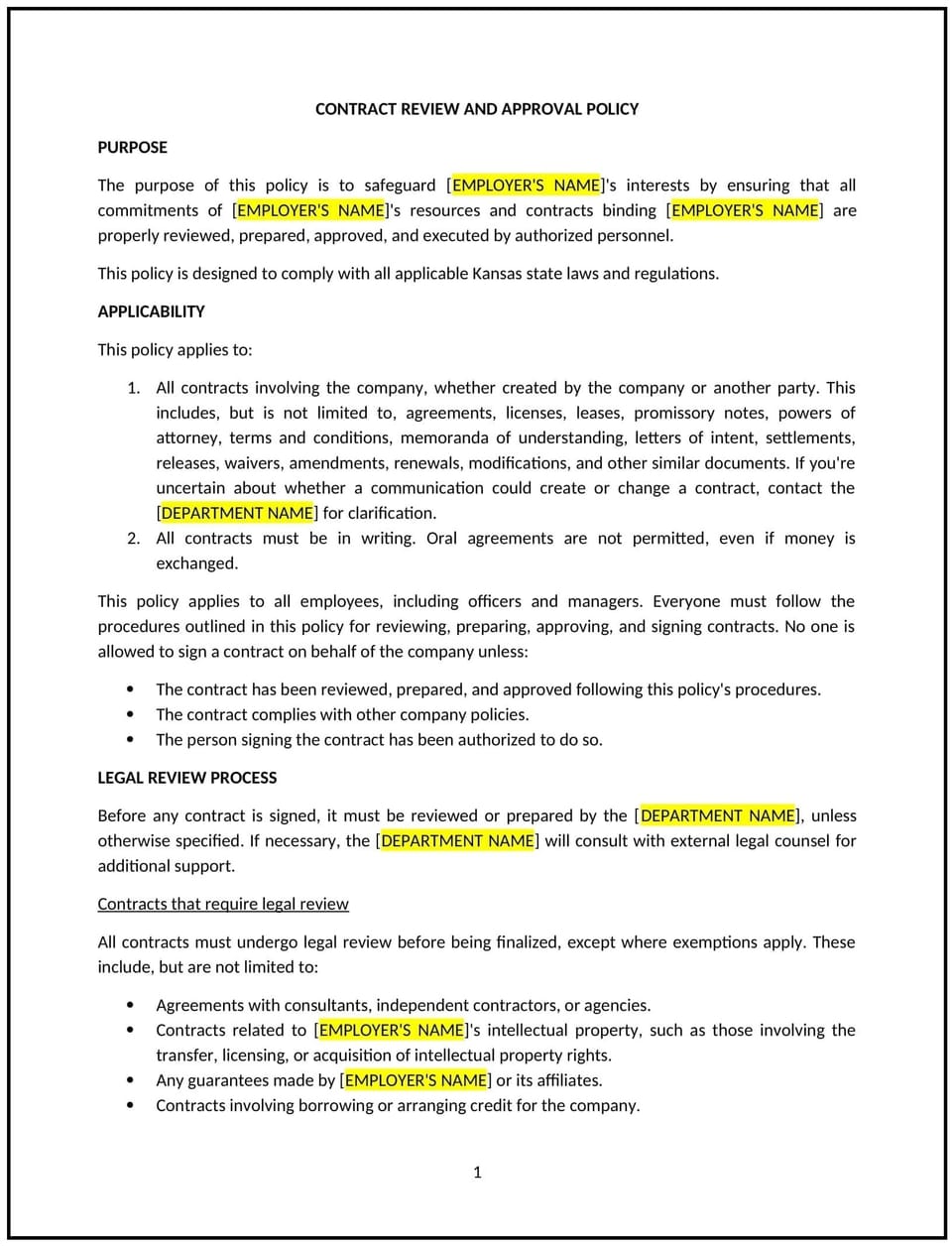Contract review and approval policy (Kansas): Free template

Contract review and approval policy (Kansas)
A contract review and approval policy helps Kansas businesses establish a structured process for evaluating, negotiating, and approving contracts before execution. This policy outlines the roles, responsibilities, and steps involved in contract review to reduce risks, clarify obligations, and protect business interests.
By implementing this policy, businesses can improve contract oversight, prevent costly mistakes, and ensure agreements align with strategic and financial goals.
How to use this contract review and approval policy (Kansas)
- Define contract types: Businesses should specify which contracts require formal review, such as vendor agreements, client contracts, leases, or partnership agreements.
- Establish review responsibilities: Businesses should assign roles for reviewing contracts, including legal teams, finance departments, or designated contract approvers.
- Set approval thresholds: Businesses should determine financial or risk-based thresholds that require additional review or executive approval.
- Outline contract negotiation guidelines: Businesses should establish key negotiation principles, such as pricing, payment terms, liability limitations, and termination clauses.
- Require documentation and tracking: Businesses should maintain a record of all reviewed contracts, revisions, and approvals for future reference.
- Implement version control: Businesses should track contract edits and maintain a central repository for final, executed agreements.
- Review and update regularly: Businesses should periodically assess contract review procedures to reflect operational and legal considerations.
Benefits of using a contract review and approval policy (Kansas)
- Reduces legal and financial risks: Helps businesses identify unfavorable terms before signing agreements.
- Improves contract consistency: Establishes standardized terms and conditions across agreements.
- Prevents disputes and misunderstandings: Clarifies expectations for both parties before finalizing contracts.
- Strengthens negotiation strategies: Provides a structured approach for securing favorable terms.
- Enhances record-keeping: Ensures all contract approvals are documented for future reference.
- Streamlines approval workflows: Reduces delays in contract execution by defining a clear review process.
Tips for using this contract review and approval policy (Kansas)
- Define clear approval steps: Businesses should ensure employees understand when contracts require review and who must approve them.
- Use contract management tools: Businesses should consider using digital platforms to track contract status, approvals, and revisions.
- Involve legal or compliance teams when necessary: Businesses should seek legal review for high-risk or complex agreements.
- Establish turnaround times: Businesses should define expected review and approval timelines to prevent unnecessary delays.
- Educate employees on contract risks: Businesses should train relevant staff on identifying common contractual pitfalls and negotiation techniques.
- Maintain secure contract storage: Businesses should store executed agreements in a secure and accessible repository.
Q: Why should Kansas businesses implement a contract review and approval policy?
A: Businesses should implement a contract review and approval policy to reduce risks, improve negotiation outcomes, and maintain consistency across agreements.
Q: Who should be responsible for contract review?
A: Businesses should assign contract review responsibilities based on agreement type, typically involving department heads, finance teams, and legal advisors for high-value or complex contracts.
Q: How should businesses track contract approvals?
A: Businesses should document all approvals, maintain version control, and use a central repository to store final agreements for easy retrieval.
Q: What should businesses do if a contract includes unfavorable terms?
A: Businesses should negotiate revisions, seek legal guidance if necessary, and ensure final agreements align with company policies and risk tolerance.
Q: How should businesses handle contract renewals?
A: Businesses should set reminders for contract expiration dates, review renewal terms in advance, and renegotiate terms when appropriate.
Q: How often should businesses review and update their contract review and approval policy?
A: Businesses should review their policy annually or whenever operational or legal considerations require adjustments to the contract review process.
This article contains general legal information and does not contain legal advice. Cobrief is not a law firm or a substitute for an attorney or law firm. The law is complex and changes often. For legal advice, please ask a lawyer.


